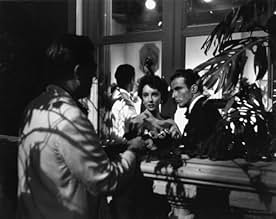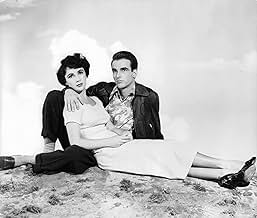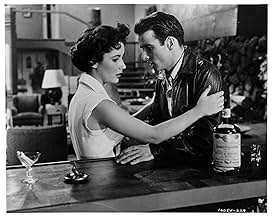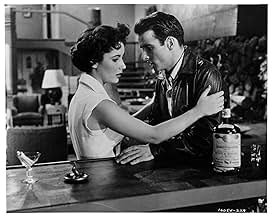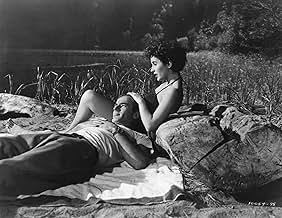NOTE IMDb
7,7/10
25 k
MA NOTE
Un pauvre jeune garçon travaille pour son riche oncle riche et finit par tomber amoureux de deux femmes.Un pauvre jeune garçon travaille pour son riche oncle riche et finit par tomber amoureux de deux femmes.Un pauvre jeune garçon travaille pour son riche oncle riche et finit par tomber amoureux de deux femmes.
- Récompensé par 6 Oscars
- 15 victoires et 10 nominations au total
Robert J. Anderson
- Eagle Scout
- (non crédité)
Gertrude Astor
- Bit Part
- (non crédité)
Histoire
Le saviez-vous
- AnecdotesIn her autobiography, Shelley Winters described producer and director George Stevens' way of working: "He would discuss the scene, but not the lines, and would photograph the second or third rehearsal so the scene had an almost improvisatory quality. Stevens would print the first take, then spend the next three hours minutely rehearsing the scene, then film it again. He explained to me that in this way he often got actors' unplanned reactions that were spontaneous and human and often exactly right. And often when actors overintellectualize or plan their reactions, they aren't as good."
- GaffesAlice Tripp is wearing different shoes when she starts walking home from the movie with George Eastman from those she is wearing when they near her residence. When Shelley Winters pointed out to director George Stevens that the brown and white shoes she was wearing turned to black when she walked around the corner, the director refused to re-shoot the scene. According to Winters, he said, "If they're looking at her feet, I can go home."
- ConnexionsFeatured in Hollywood: The Fabulous Era (1962)
Commentaire à la une
George Eastman takes up friendly offer from his uncle to go work in the highly prosperous Eastman bathing-suit factory. Formerly a bell hop at a hotel, and born out of a relatively poor, but religiously devout home, George is spellbound by how the upper crust live. As he starts to climb the social ladder he becomes besotted with his cousin's beautiful partner, Angela Vickers. While at the same time neglecting his girlfriend and mother of his unborn child, Alice Tripp. The outcome of George's confused emotions will have devastating effects on everyone involved...
A Place In The Sun is one of those revered, yet seemingly divisive classic pictures that I believe deserves every bit of praise heaped upon it. Based on the Theodore Dreiser novel, An American Tragedy {and the Patrick Kearney play}, it's a slow simmering piece that boasts technical greatness and a class division script that is intriguingly shrouded by a real life sad story. The book and subsequent film versions {Josef von Sternberg filmed an adaptation in 1931} are working from the real case of Chester Gillette and his girlfriend, Grace Brown. To expand further would result in major spoilers but it's a case that is readily available to anyone with internet access. Here with this adaptation, director George Stevens {sublime direction} has gathered all the things available to him and crafted a Gothic, almost dreamy, classic amongst classics. The source, and Sternberg's take on the novel may well be more stark and grimly oppressive, but this has such high cinema values it positively begs you to invest your very being with it.
The story behind the scenes is itself worthy of a movie, Stevens clashing constantly with Montgomery Clift {Eastman} and Shelley Winters {Tripp}, Clift because he would only take motivation from his personal coach, Mira Rostova, and Winters because Stevens had never wanted her cast in the first place! Then there is the Elizabeth Taylor {Angela Vickers} factor, blissfully unaware of Clift's burgeoning homosexuality, she reciprocated Clift's adoration of her by falling for him big time, the results, all captured by Stevens, are akin to being put under a spell that you simply can't turn away from. Montgomery Clift was one of the best actors of his generation, here in spite of a secretly confused emotional state, the sparks that ping off Taylor and himself are the kind that few lauded chemistry couples in movie history have ever gotten close too. Monty Clift is worth every penny or cent that is spent to watch him perform, here is yet another performance of emotional oomph to only confirm his standing as a true giant of American actors.
Academy Awards went to Best Director, Best Screenplay {Michael Wilson & Harry Brown}, Best Cinematography {William Mellor}, Best Costume Design {Edith Head}, Best Editing {William Hornbeck} and Best Score {Franx Waxman}, all of them deserved, with Waxman's score one of the true greats of 50s cinema, a character in itself and something to totally lose yourself in. Clift & Winters were both nominated in the Best actor/Actress categories respectively, and really in any other year they surely would have won, while the film itself was also nominated for Best Film. Ultimately it's the story itself that makes A Place In The Sun such a beguiling viewing, it's love divided by classes, no middle ground here, it's the rich and beautiful on one side, on the other is the plain and poor, the result is a majestic piece of cinema. 10/10
A Place In The Sun is one of those revered, yet seemingly divisive classic pictures that I believe deserves every bit of praise heaped upon it. Based on the Theodore Dreiser novel, An American Tragedy {and the Patrick Kearney play}, it's a slow simmering piece that boasts technical greatness and a class division script that is intriguingly shrouded by a real life sad story. The book and subsequent film versions {Josef von Sternberg filmed an adaptation in 1931} are working from the real case of Chester Gillette and his girlfriend, Grace Brown. To expand further would result in major spoilers but it's a case that is readily available to anyone with internet access. Here with this adaptation, director George Stevens {sublime direction} has gathered all the things available to him and crafted a Gothic, almost dreamy, classic amongst classics. The source, and Sternberg's take on the novel may well be more stark and grimly oppressive, but this has such high cinema values it positively begs you to invest your very being with it.
The story behind the scenes is itself worthy of a movie, Stevens clashing constantly with Montgomery Clift {Eastman} and Shelley Winters {Tripp}, Clift because he would only take motivation from his personal coach, Mira Rostova, and Winters because Stevens had never wanted her cast in the first place! Then there is the Elizabeth Taylor {Angela Vickers} factor, blissfully unaware of Clift's burgeoning homosexuality, she reciprocated Clift's adoration of her by falling for him big time, the results, all captured by Stevens, are akin to being put under a spell that you simply can't turn away from. Montgomery Clift was one of the best actors of his generation, here in spite of a secretly confused emotional state, the sparks that ping off Taylor and himself are the kind that few lauded chemistry couples in movie history have ever gotten close too. Monty Clift is worth every penny or cent that is spent to watch him perform, here is yet another performance of emotional oomph to only confirm his standing as a true giant of American actors.
Academy Awards went to Best Director, Best Screenplay {Michael Wilson & Harry Brown}, Best Cinematography {William Mellor}, Best Costume Design {Edith Head}, Best Editing {William Hornbeck} and Best Score {Franx Waxman}, all of them deserved, with Waxman's score one of the true greats of 50s cinema, a character in itself and something to totally lose yourself in. Clift & Winters were both nominated in the Best actor/Actress categories respectively, and really in any other year they surely would have won, while the film itself was also nominated for Best Film. Ultimately it's the story itself that makes A Place In The Sun such a beguiling viewing, it's love divided by classes, no middle ground here, it's the rich and beautiful on one side, on the other is the plain and poor, the result is a majestic piece of cinema. 10/10
- hitchcockthelegend
- 7 nov. 2008
- Permalien
Meilleurs choix
Connectez-vous pour évaluer et suivre la liste de favoris afin de recevoir des recommandations personnalisées
Détails
Box-office
- Budget
- 2 295 304 $US (estimé)
- Montant brut mondial
- 748 $US
- Durée2 heures 2 minutes
- Couleur
- Rapport de forme
- 1.37 : 1
Contribuer à cette page
Suggérer une modification ou ajouter du contenu manquant

Lacune principale
By what name was Une place au soleil (1951) officially released in India in English?
Répondre


